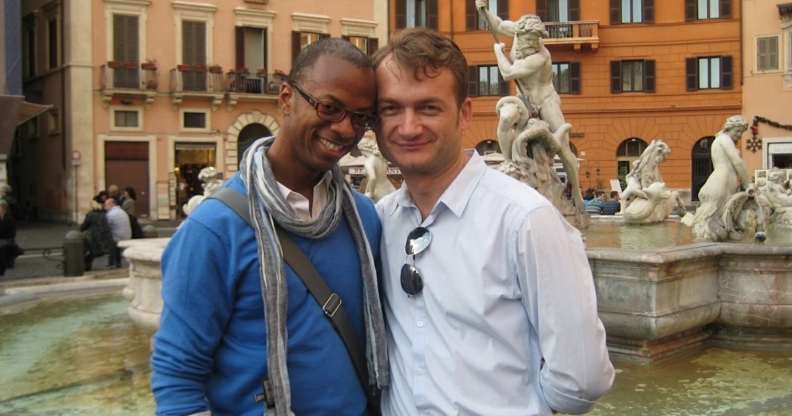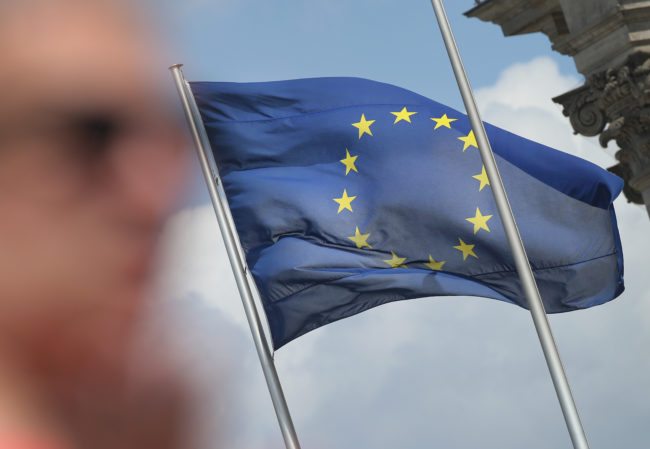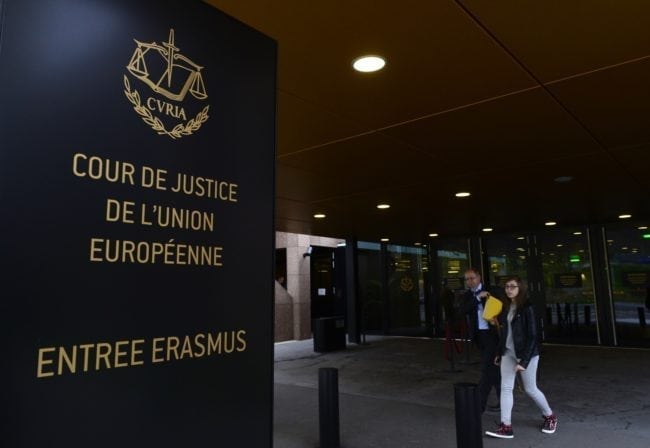European Court of Justice says same-sex spouses have equal residency rights in landmark ruling

The European Court of Justice has ruled that governments must recognise the movement rights of same-sex spouses – even in countries that do not permit gay weddings.
The landmark ECJ ruling comes in the case of Romanian national Adrian Coman, who tied the knot to American man Claibourn Robert Hamilton in Belgium in 2010.
The pair had wanted to start a life together in Romania, but because the country does not recognise same-sex unions, they were denied the spousal residency rights for Hamilton that a wife would be entitled to.
But after a legal battle with the Romanian government, today (June 5) the Court of Justice of the European Union issued a landmark ruling in favour of the couple’s rights applying across the EU.
According to an ECJ summary, the court ruled that: “In the directive on the exercise of freedom of movement the term ‘spouse’, which refers to a person joined to another person by the bonds of marriage, is gender-neutral and may therefore cover the same-sex spouse of an EU citizen.”

Adrian Coman and Claibourn Robert Hamilton
It adds: “The EU respects the national identity of the Member States, inherent in their fundamental structures, both political and constitutional.
“The Court nonetheless considers that the refusal by a Member State to recognise, for the sole purpose of granting a derived right of residence to a national of a non-EU state, the marriage of that national to an EU citizen of the same sex lawfully concluded in another Member State may interfere with the exercise of that citizen’s right to move and reside freely within the territory of the Member States.”
It notes: “The obligation for a Member State to recognise a homosexual marriage concluded in another Member State in accordance with the law of that state, for the sole purpose of granting a derived right of residence to a national of a non-EU state, does not undermine the institution of marriage in the first Member State.
“In particular, that obligation does not require that Member State to provide, in its national law, for the institution of homosexual marriage.
“Moreover, an obligation to recognise such marriages, for the sole purpose of granting a derived right of residence to a national of a non-EU state, does not undermine the national identity or pose a threat to the public policy of the Member State concerned.”
It adds: “The fundamental right to respect for family and private life being guaranteed by Article 7 [of the Charter of Fundamental Rights of the European Union], the Court notes that it is also apparent from the case-law of the European Court of Human Rights that the relationship of a homosexual couple may fall within the notion of ‘private life’ and that of ‘family life’ in the same way as a relationship of a heterosexual couple in the same situation.”

An EU flag (Sean Gallup/Getty)
The couple and LGBT activists celebrated the ruling.
Adrian Coman said: “We can now look in the eyes of any public official in Romania and across the EU with certainty that our relationship is equally valuable and equally relevant, for the purpose of free movement within the EU.
“We are grateful to the EU Court and to the many people and institutions who have supported us, and through us, other same-sex couples in a similar situation. It is human dignity that wins today.”
Romanița Iordache, a member of the legal team from the ACCEPT Association, said: “Today, Adrian, Clai and ACCEPT won a great victory for same-sex couples across Europe.
“Starting from this moment onward, all EU norms applying to spouses should also equally to all same-sex families.
“Romanian authorities now have an obligation to respect the CJEU decision, and ensure residency rights and minimal recognition for all same-sex families in a similar situation.”

The entrance of the European Court of Justice (SCJ) in Luxembourg (JOHN THYS/AFP/Getty)
Vlad Viski, executive director of Romanian LGBT group MozaiQ, said: “MozaiQ welcomes the decision by the Court of Justice of the European Union concerning freedom of movement of same sex spouses.
“We believe it is a major victory for LGBT rights throughout the European Union and it is a first step towards change for equality for all.
“For the LGBT community in Romania the decision has symbolic implications as well, after decades of criminalization of homosexuality and inactivity by the political class.
“We congratulate Adrian Coman and Clai Hamilton, as well as our colleagues from the ACCEPT Association, who represented them.
“We urge the Constitutional Court of Romania to move swiftly towards implementing the CJEU decision and we ask the members of the Romanian parliament to urgently legalize civil unions, recognizing gay couples as equal under the law.”
Evelyne Paradis of European-wide LGBT movement ILGA-Europe said: “Equality, fairness and pragmatism were at the core of today’s verdict from Luxembourg.
“The CJEU has confirmed that rainbow families should be recognised equally in the eyes of the law on freedom of movement. Now we want to see the Romanian authorities move swiftly to make this judgment a reality.”
Arpi Avetisyan, ILGA-Europe Litigation Officer continued: “From the first moment that ILGA-Europe made submissions in the Coman proceedings at national level in 2016, we could see the immensely positive impact the case could have.
“It will increase legal protection and certainty for same-sex couples – something that should not be underestimated.
“This clarity will be felt not just by couples in Romania, but all over the EU, highlighting the power of strategic litigation and the enduring relevance of the EU and its laws in people’s lives.”

